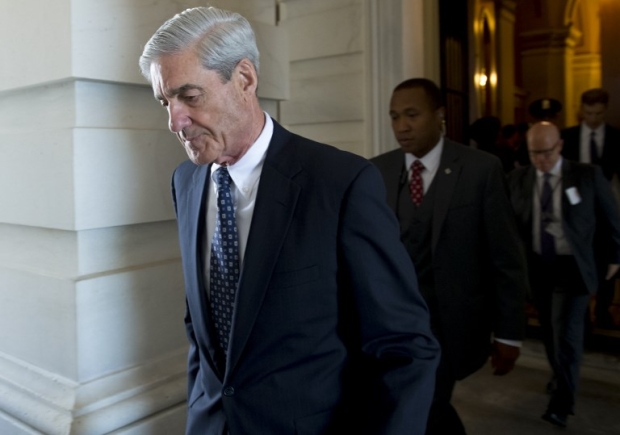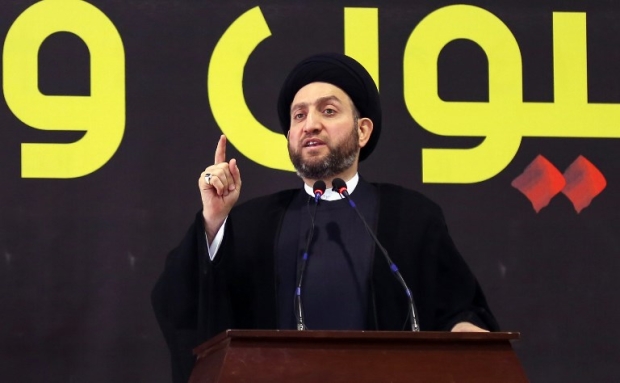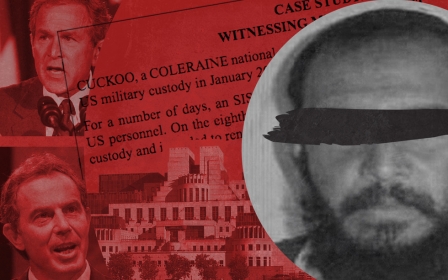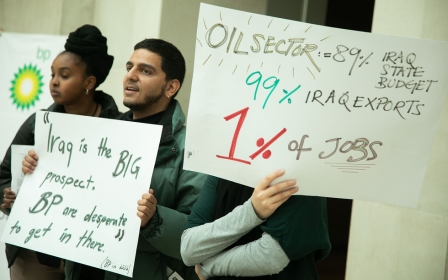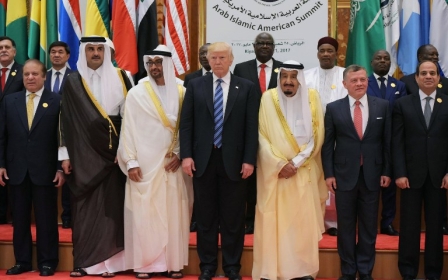EXCLUSIVE: UAE-linked witness in Mueller probe met with top Iraqi officials
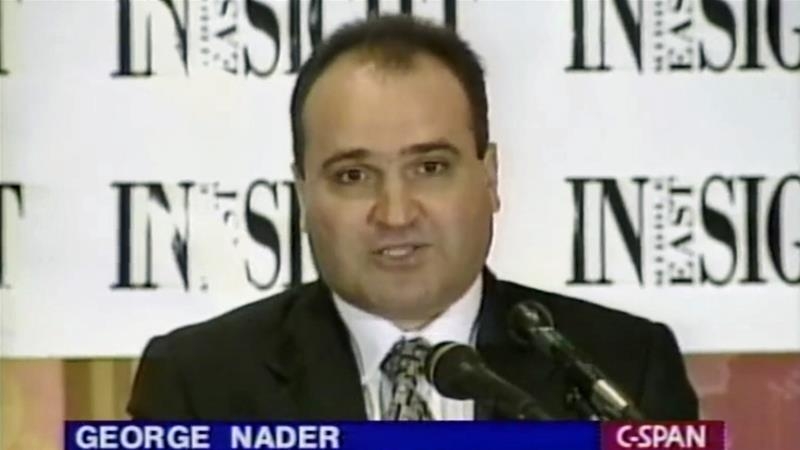
A controversial Lebanese-American businessman who is a witness in special counsel Robert Mueller’s investigation into Donald Trump’s campaign funding is back in action working in the Middle East, two senior Iraqi officials and a third source have told Middle East Eye.
During a visit to Baghdad two weeks ago, George Nader, a convicted paedophile, liaised with some of Iraq’s highest officials, and was hosted at the house of a top Shia leader with close links to Iran, the sources said.
'Nader is perfectly positioned to broker deals with Iraqi [Shia] political parties, Hasdh militias and their Iranian allies'
- Muhanad Seloom, University of Exeter associate lecturer
Nader's visit comes as Iraq emerges as the latest battleground between Qatar, and the United Arab Emirates and Saudi Arabia, in a protracted dispute which has all but destroyed diplomatic relations between the countries.
In a bid to win influence in strategically-located Iraq, the three Gulf rivals have flooded the country with millions of dollars in construction projects and support for political parties and politicians in recent months, three Iraqi political advisors and observers told MEE.
Their race for influence coincides with the Iraqi government’s intention, with the military defeat of the Islamic State group, to begin the challenge of rebuilding the country after four decades of conflict and sanctions.
"It's not just the contracts. It's the reach," said Anas al-Tikriti, a British-Iraqi who heads the Cordoba Foundation, a UK-based research and advisory group. "The position of Iraq is ideal for those who want to effect any kind of influence on the region."
The trip puts Nader, an adviser to United Arab Emirates Crown Prince Mohammed bin Zayed al-Nahyan, back on the radar after he emerged earlier this year as a key figure in Mueller’s investigation which seeks to discover whether foreign countries sought to influence the 2016 US presidential elections.
Mueller has reportedly questioned the 58-year-old businessman about whether the UAE funnelled money to members of the Trump administration to curry favour, including in its battle with Qatar. Nader is said to be cooperating with Mueller in exchange for immunity.
As MEE has previously reported, Nader put together a summit of Arab leaders in late 2015 who met on a yacht in the Red Sea to plot out how to replace the Gulf Cooperation Council and the Arab League.
He also arranged a March 2017 meeting with Saudi intelligence officials in which he and other businessmen pitched a $2bn plan to sabotage the Iranian economy, the New York Times reported this month.
During that meeting, according to the report, the Saudis asked whether Nader and other businessmen at the meeting would be willing to assassinate senior Iranian officials. They said they would need to consult their lawyer who advised them not to get involved.
'So many roles'
During the recent visit in Baghdad, the sources said, Nader met with the newly elected Iraqi President Barham Salih and Prime Minister Adil Abdul-Mahdi.
According to two of the sources, he also stayed at the home of Ammar al-Hakim, the head of the Hikma movement, a Shia political party. MEE reported earlier this year that Hakim connected Nader with Iran’s Revolutionary Guards who have subsequently used Nader to pass messages to Middle East states.
MEE asked Salih's spokesperson to comment three times about the meeting with Nader, but did not receive a response. Nader's lawyer, Sandeep Savla, said in a phone call that he would take MEE's queries under consideration, but has not responded to emailed questions.
Mohammed al-Rahdi, a close advisor to Hakim, denied that Nader had visited Hakim in the past few weeks or months.
"George Nader, he's a businessman. He's visited everywhere," Rahdi said.
"Two weeks ago, there was no such meeting," he said.
He also disputed reports that Hakim had helped create a backchannel between the Iranian Revolutionary Guard Corps and Gulf countries, using Nader as a conduit.
"They don't need such a channel," he said of the Iranians, the Emirates and the Saudis. "They have their own channels. So many channels."
Race for influence
The recent influx of Gulf money into Iraq began in earnest last year. One source said the rush started after the Qataris paid more than $300m in April 2017 to the Shia militia, Kata’ib Hezbollah, and other parties after nine members of the royal family and 16 other Qatari nationals were kidnapped during a falcon hunting trip in Iraqi in late 2016.
'The position of Iraq is ideal for those who want to effect any kind of influence on the region'
- Anas al-Takriti, Cordoba Foundation
"After they paid, the Qataris took advantage of this money to build a good relationship with the ruling [Shia] parties and Hashd militias," said Muhanad Seloom, associate lecturer in politics and international relations at the University of Exeter.
When the Iraqi government was being formed this year, he said, the Qataris stepped up their financial investments, and was able to help its Sunni allies gain influence and secure senior government posts.
"In contrast, Sunni politicians close to Saudi Arabia have not been able to match their ambitions despite regional support," said Seloom. "Unlike Saudi Arabia, Qatar does not pose a strategic threat to Iran and its allies in Iraq."
In addition to giving money to political groups and politicians, the Gulf countries have also invested in major commercial deals that are now springing up in Iraq as the government turns its focus towards rebuilding after the defeat of IS.
"Iraq is endowed with immense natural resources, water, fertile land, and an indispensable geopolitical position that can become the hub for regional trade and economic intervention," Iraqi President Barham Salih told the audience at the MED Dialogues conference in Rome on Thursday.
"Yet decades of war, sanctions, conflict, economic mismanagement and corruption have turned Iraq into an extreme rentier state. This is simply unsustainable."
The pull to invest in Iraq is strong, said Tikriti: "Everyone wants to be part of Iraq which is heading towards some stabilisation. There will be mega-reconstruction projects, a semblance of normalcy."
But belying the cash flows is a geopolitical power struggle and Iraq, said Tikriti, is a jewel in the crown.
Both Seloom and Tikriti questioned how involved the Americans might be in the Gulf race in Iraq, given Nader's connections with senior US officials.
"If Saudi Arabia has a solid footing in Iraq, then the Americans have a solid footing in Iraq," Tikriti said. "So rather than Americans sending in troops, you have a good contact, so you won't have to have a huge presence that will cost you lives."
This wouldn't be Nader's first venture in Iraq: in 2012, he acted as an informal advisor to then-Iraqi president Nouri al-Maliki, helping broker a $4.2bn weapons deal between Iraq and Russia.
The deal reportedly fell apart when the Russians grew suspicious of the middleman, demanding to deal directly with Maliki. The deal was agreed in late 2012, but was cancelled several months later over corruption concerns.
Seloom said he didn't think Nader's previous history, nor his recent bad press would be problematic for him in Iraq. He would thrive in controversy.
"Nader is perfectly positioned to broker deals with Iraqi [Shia] political parties, Hasdh militias and their Iranian allies," he said.
This article is available in French on Middle East Eye French edition.
Middle East Eye propose une couverture et une analyse indépendantes et incomparables du Moyen-Orient, de l’Afrique du Nord et d’autres régions du monde. Pour en savoir plus sur la reprise de ce contenu et les frais qui s’appliquent, veuillez remplir ce formulaire [en anglais]. Pour en savoir plus sur MEE, cliquez ici [en anglais].


